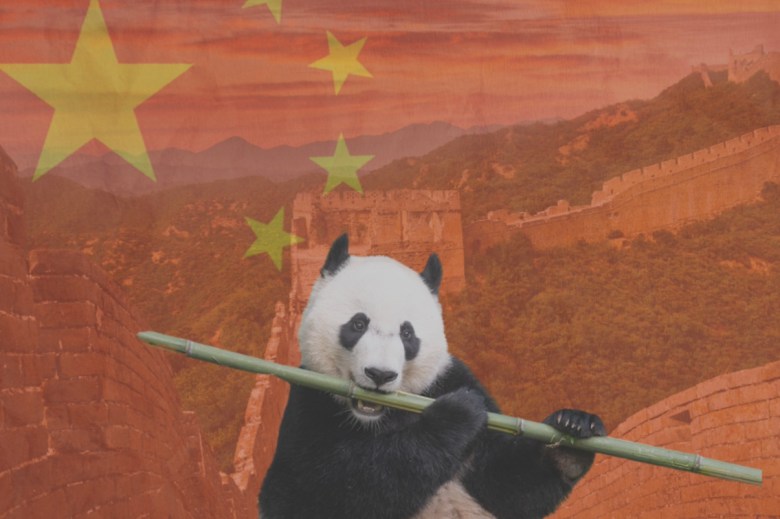Politics
China’s Pandas Serve as Diplomatic Tools Amid Rising Tensions

During Anthony Albanese’s recent visit to the Chengdu panda breeding base, he highlighted the enduring significance of China’s unique form of diplomacy known as “panda diplomacy.” This practice, which dates back to the 1940s, involves sending giant pandas to various countries, often for political purposes. The term gained prominence when China gifted two pandas to the United States during Richard Nixon’s historic visit in 1972.
A new paper published in The Pacific Review delves into the role of panda diplomacy within the Chinese state. The authors argue that its importance remains relevant, even in times of heightened political tension, such as the current state of US-China relations. The giant panda’s universal appeal serves as a rare source of soft power for China, fostering positive feelings and cultural acceptance globally. Yet, this cuteness comes with a significant vulnerability.
Pandas as National Treasures
Within China, pandas are considered “national treasures,” eliciting strong emotions from citizens, especially nationalists who express concern over the practice of sending them abroad. This tension between popular nationalism and official foreign policy is not new, and the emotional weight surrounding pandas was highlighted during the controversy following the death of a panda at the Memphis Zoo.
In February 2023, a 25-year-old giant panda named Lele passed away due to heart disease just before he was scheduled to return to China after a two-decade-long loan. His female companion, Yaya, returned shortly after, having suffered from a long-term skin condition. Concerns about their treatment in the US emerged when American animal rights organizations, including In Defense of Animals and Panda Voices, shared distressing images of the pandas appearing unhealthy, which fueled rumors on Chinese social media about their care. These discussions were steeped in nationalist rhetoric, with many users calling for an end to panda diplomacy.
A Measured Government Response
Amidst a backdrop of deteriorating relations between the US and China, particularly following the incident involving a Chinese surveillance balloon, the Chinese government responded to the Memphis Zoo controversy with a surprising level of restraint. Mao Ning, spokesperson for the Chinese Foreign Ministry, stated that the pandas had received appropriate care and confirmed that their conditions were standard for pandas in their later years. She praised the Memphis Zoo’s management, reflecting a diplomatic approach even in the face of rising nationalistic sentiments.
Notably, the Global Times, a state-owned newspaper, published editorials that defended the American zoo’s actions while acknowledging the public’s concerns. This measured response was consistent when a panda at a zoo in Thailand later died, indicating a broader strategy in handling panda-related incidents.
The emotional significance of pandas in China stems from their unique history as a national symbol. Historically, pandas were largely absent from Chinese culture until the 20th century. Unlike many national symbols that are fierce and powerful, pandas are celebrated for their gentleness and clumsiness, embodying a sense of vulnerability. This attachment is further deepened by the fact that wild pandas are native only to China, paralleling the sentiments Australians have towards koalas or New Zealanders with kiwis.
Research into mentions of pandas in the People’s Daily newspaper shows a growing recognition of pandas as a national treasure dating back to the 1950s. Their international popularity surged in the 1970s, particularly after pandas were gifted to other nations. A critical moment occurred in 1983 when a bamboo flowering event threatened the wild panda population in Sichuan, prompting mass mobilization within China to save these cherished animals. This incident cemented the panda’s status as a global conservation icon.
Today, pandas symbolize not only China but also international friendship, environmental consciousness, and the universal appeal of cuteness. The layers of symbolism associated with pandas generate complex feelings within China, particularly regarding the future of panda diplomacy.
In 2023, speculation arose that pandas might not return to the US and Australia due to strained diplomatic relations. While these concerns proved premature, the underlying question of whether these “national treasures” should serve as diplomats remains a contentious issue in a world characterized by both ecological and political vulnerabilities.
The authors of the paper, David Smith, an associate professor in American politics and foreign policy at the US Studies Centre, and Minglu Chen, a senior lecturer in government and international relations at the University of Sydney, suggest that the future of panda diplomacy will continue to evoke strong emotional and political responses.
-

 Business5 months ago
Business5 months agoKenvue Dismisses CEO Thibaut Mongon as Strategic Review Advances
-

 Lifestyle4 months ago
Lifestyle4 months agoHumanism Camp Engages 250 Youths in Summer Fest 2025
-

 Sports4 months ago
Sports4 months agoDe Minaur Triumphs at Washington Open After Thrilling Comeback
-

 Sports5 months ago
Sports5 months agoTupou and Daugunu Join First Nations Squad for Lions Clash
-

 Top Stories5 months ago
Top Stories5 months agoColombian Senator Miguel Uribe Shows Signs of Recovery After Attack
-

 World5 months ago
World5 months agoASEAN Gears Up for Historic Joint Meeting of Foreign and Economic Ministers
-

 Health4 months ago
Health4 months agoNew Study Challenges Assumptions About Aging and Inflammation
-

 Business5 months ago
Business5 months agoOil Prices Surge Following New EU Sanctions on Russia
-

 Entertainment4 months ago
Entertainment4 months agoDetaşe-Sabah Violin Ensemble Captivates at Gabala Music Festival
-

 Entertainment4 months ago
Entertainment4 months agoBaku Metro Extends Hours for Justin Timberlake Concert
-

 Top Stories5 months ago
Top Stories5 months agoRethinking Singapore’s F&B Regulations Amid Business Closures
-

 Business5 months ago
Business5 months agoU.S. House Approves Stablecoin Bill, Sends to Trump for Signature









